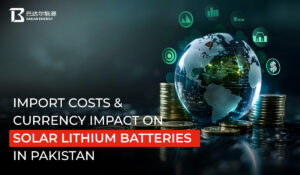Quick Summary:
Pakistan’s energy landscape is entering a major transition, driven by rapid solar adoption and the rise of Large Scale Battery storage. Net metering sparked growth, but changing grid demands now require smarter, storage-based policies. With NEPRA preparing new regulations, the combination of battery storage and solar has become essential for stability and financial viability. Badar Energy’s advanced lithium solutions enable higher self-consumption, lower grid dependence, and improved ROI. This blog explains the upcoming policy shifts and how Large Scale Battery systems will reshape Pakistan’s renewable energy future.
Pakistan’s energy sector is changing fast. The solar power boom drives this national transformation. Now, the integration of Large Scale Battery storage is beginning a new revolution. This is more than a simple technical upgrade. It is the key to a resilient and efficient energy future.
For a pioneering company like Badar Energy, this evolution is central. Our advanced storage solutions are ready for this market shift. The current net-metering system fueled the solar expansion. Now, it stands at a crucial crossroads.
Regulatory challenges and changing grid demand force new policies. The NEPRA solar policy updates are poised to redefine solar interactions. The answer lies in combining battery storage and net metering. This powerful synergy stabilizes the grid. It maximizes self-consumption for all users. It also creates vital new revenue streams for solar investors.
This article details the necessary policy changes. We will show how to integrate large scale solar battery use seamlessly. Badar Energy’s advanced lithium battery solutions are the technology needed. They are essential to power this vital national transition.
Net Metering: The Dawn of a New Era
Pakistan’s net-metering framework was introduced in 2015. It has been a phenomenal success story. It sparked a massive increase in rooftop solar capacity nationwide. The initial incentives were highly attractive. Consumers sold their surplus generation back to the grid. This was done at a retail or favorable average power purchase price. This policy offered investors a quick 2-4 year payback period.
However, this rapid success created complications for the national grid. The energy system faces significant structural challenges.
The Grid Strain and Fixed Costs
Massive solar power is injected during the day. This energy flows directly into the grid without storage. This unmanaged flow creates a “duck curve” effect. It leads to periods of high stress on distribution networks.
Distribution companies (DISCOs) face high fixed capacity charges. They must pay power producers regardless of energy usage. A growing number of solar users avoid these fixed costs. This burden then shifts to non-solar grid users. This cycle ultimately drives up the overall consumer tariffs.
Proposed Policy Shifts and Investor Concern
Regulators, including NEPRA, are addressing these structural issues. Several significant amendments are currently under consideration. These potential changes aim to rebalance the market.
Key proposals include:
- Reducing the Buyback Rate: This change would lower the price paid for exported solar energy.
- Transition to Net Billing: This system charges a high rate for imported energy. It credits a much lower rate for exported energy.
- Capping System Size: Regulations may limit the size of new solar systems.
These adjustments are necessary for grid sustainability. However, they threaten the financial viability of solar-only setups. The payback period for these systems will certainly extend. This is where the power of a Large Scale Battery becomes critical. Storage technology provides the immediate solution.
The Engine of Grid Optimization
The future of solar incentives in Pakistan hinges on one factor. That factor is maximizing energy self-consumption. This means using the power you generate on-site. It involves minimizing the amount of power sent to the grid. The role of Large Scale Battery storage is clear here. It makes self-consumption efficient and reliable.
The initial net-metering model encouraged selling all excess power. This leads to a midday supply glut. It causes a sharp demand surge at night. New policy must reward strategic energy management. It should incentivize storing energy for peak-time use. This approach benefits consumers and stabilizes the grid.
The Badar Energy Technology Advantage
Badar Energy is Pakistan’s leading lithium battery manufacturer. We are perfectly positioned to serve this evolving market. Our Large Scale Battery solutions are market-leading. They utilize advanced LiFePO4 (Lithium Iron Phosphate) technology.
Our systems deliver superior performance:
- High Efficiency and Reliability: Lithium-ion provides high-density storage capacity. It offers rapid charge and discharge capabilities. These features are essential for modern solar setups. They allow for industry-leading self-consumption rates.
- Unmatched Resilience: Pakistan often deals with power outages. Our batteries provide genuine energy independence. This resilience is a powerful selling point. It offers value far beyond simple economic returns.
- Scalability for Every Sector: We cater to diverse energy needs. Our offerings range from home storage units to commercial solutions. We also supply industrial-grade battery systems. Badar Energy offers the reliable storage necessary. It protects and maximizes every solar investment. Our systems are built for endurance and consistent performance.
Policy Blueprint: Rewarding Smart Storage
To fully leverage large scale solar battery use, policy must adapt. NEPRA solar policy updates need to move past simple energy transactions. They must embrace sophisticated, market-responsive models. This strategy will directly incentivize advanced storage solutions.
1. The Time-of-Use (TOU) Net Billing Model
A new structure should replace the flat-rate buyback system. A TOU net billing mechanism is the optimal choice. It offers higher compensation for energy export to grid Pakistan during peak hours. Export rates would be lower during non-peak, midday hours.
- Financial Incentive: Battery owners maximize their revenue. They store midday solar power when grid value is low. They then export it during the high-value evening peak. This provides crucial, targeted grid support.
- Badar Energy’s Solution: Our intelligent battery management systems (BMS) are key. They automatically charge during low-cost times. They discharge during high-cost peak times. This capability is known as peak shaving. It turns the consumer’s solar setup into a proactive profit center.
2. Capacity Credits for Grid Resilience
Policy must recognize the non-energy value of a battery. The system’s ability to reduce peak demand is immensely valuable. It maintains local power stability during grid stress. This value should translate into financial credits.
- Incentive: Introduce fixed capacity credits for battery systems. Offer a reduction in fixed charges to battery owners. These credits apply if the systems are certified. They must participate in Demand Response programs. DISCOs can request these systems to discharge during emergencies.
- Badar Energy’s Role: We supply robust lithium batteries. Our units are built for high-cycle use. They are perfect for this rigorous, grid-interactive application. We ensure compliance with the highest standards.
3. Clear Standards for Net Metering with Batteries in Pakistan
Scaling up battery integration requires clarity. The process for connecting a battery system must be simple. Clear, standardized technical and procedural requirements are necessary.
- Incentive: NEPRA must publish specific guidelines. These guidelines must cover battery-integrated systems. This simplifies the approval process for all parties. It ensures safe and compliant interconnection.
- Badar Energy’s Support: We partner with certified, expert installers. They ensure all systems meet all local and global standards. This guarantees compliant installations and smooth approvals.
Economic Returns: Future-Proofing Solar ROI
For businesses and homeowners, a Large Scale Battery alters system economics. It is a protective measure against unfavorable net billing policies. It makes a solar setup highly resilient.
| Economic Metric | Solar-Only (Under Net-Billing) | Solar + Badar Energy Large Scale Battery |
| Midday Export Value | Compensation is low. | Energy is stored for high-value use or export. |
| Evening Power Source | Purchased from the grid at the highest retail rate. | Drawn from the battery at zero marginal cost. This eliminates expensive evening bills. |
| Grid Power Dependency | Remains dependent on the grid for stable power. | Provides full backup power and complete energy independence. |
| Payback Period (ROI) | Significantly extended by reduced buyback rates. | Optimized through strategic use and peak-hour export. It maintains a highly competitive return on investment. |
By adding a Large Scale Battery, consumers become energy managers. They strategically optimize every unit of power. They achieve the best possible financial outcome. The battery protects the long-term ROI. It makes the investment future-proof against policy changes.
Badar Energy and the Path Forward
The adoption of Large Scale Battery storage is inevitable. It is the logical next step for Pakistan’s energy sector. This move shifts the focus from simple adoption to intelligent management. It successfully addresses grid stability concerns. It secures financing for DISCOs and the government. Critically, it retains strong solar incentives in Pakistan for end-users.
Badar Energy is dedicated to powering this national transition. We provide the highest quality, most reliable lithium battery technology. Our solutions are designed for longevity and superior performance. They are essential to make large scale solar battery use an overwhelming success.
The future of energy is smart, stored, and secure. Choose the right partner for this journey.
Contact Badar Energy today for a free consultation. Discover how our advanced Large Scale Battery solutions can future-proof your investment.
1. How will NEPRA’s new net-metering policy affect solar users?
NEPRA’s updates may reduce buyback rates and introduce net billing, making battery storage essential to maintain strong ROI and reduce grid dependency.
2. Why is Large Scale Battery storage important for Pakistan’s solar future?
Batteries reduce peak load, increase self-consumption, and provide backup power—solving key grid challenges while improving financial returns.
3. Can battery storage help reduce electricity bills?
Yes. Users can store excess solar energy during the day and use it during evening peak hours, eliminating high-cost grid consumption.
4. How does Badar Energy support solar + battery integration?
Badar Energy provides advanced LiFePO4 batteries, intelligent BMS technology, certified installations, and complete solutions that ensure safety, compliance, and long-term performance.




